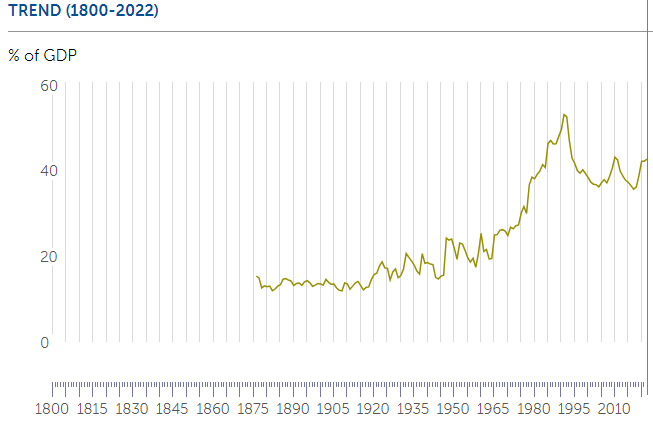The state spending to GDP graph for New Zealand tells a much different story than most of the world, though I think people still misunderstand that story.
If the state was over 50% of gdp in 1992, and it soaked up all these assets, then it sells them for a song to well connected friends of the state, then that's a symptom of central economic planning being a failure, not of capitalism or neoliberalism per se. If the state didn't try to take over so much of the economy in the first place, it wouldn't have had all these assets to unload. And then who buys the state assets? Who else? Friends or pawns of the state players.
When you rack up your credit cards, it feels good while you do that, but eventually you have to stop and that feels worse than if you never did anything.
"Oh, I bought all these funko pops and pokemon cards, and now I need to get rid of them, and I'm selling them for so much less to my buddy, it must be that I should have hung on to them!" No, you never should have bought those funko pops and pokemon cards in the first place, and when you did sell them, you didn't need to sell them to your buddy.
The other big thing is something I've been talking a lot about lately -- don't blame capitalism for the state. The story here is a story in three acts, of the state running up a tab, the state paying off its tab in ways that were ultimately corrupt, and the aftermath of paying off its tab. The state selling off state assets for a song to political friends isn't capitalism, it's... You know, I don't know what you'd even call it, perhaps state-produced oligarchy. But the state acquires assets and builds a huge public monopoly, hands the monopoly to the "private sector", then people blame capitalism for the monopoly as if the real problem wasn't the state's actions that build that monopoly.
A lot of the countries that faced something like this didn't have a choice back then. Canada had to balance its budget in the 1990s at great painful cost because literally nobody was buying bonds from Canada anymore. There just wasn't a way to get into more debt. So there was a bunch of pain because the state got too big under Trudeau the Elder, and a everyone had to deal with painful tax increases and painful spending cuts. You can say "damn you, neoliberalism and capitalism!" but the problem was in reality a state that was overextended. By the way, that happened to the Soviet Union as well, which is why it collapsed, necessitating a quick sell-off of assets which was done corruptly and resulted in a state engineered oligarchy today.
If the state was over 50% of gdp in 1992, and it soaked up all these assets, then it sells them for a song to well connected friends of the state, then that's a symptom of central economic planning being a failure, not of capitalism or neoliberalism per se. If the state didn't try to take over so much of the economy in the first place, it wouldn't have had all these assets to unload. And then who buys the state assets? Who else? Friends or pawns of the state players.
When you rack up your credit cards, it feels good while you do that, but eventually you have to stop and that feels worse than if you never did anything.
"Oh, I bought all these funko pops and pokemon cards, and now I need to get rid of them, and I'm selling them for so much less to my buddy, it must be that I should have hung on to them!" No, you never should have bought those funko pops and pokemon cards in the first place, and when you did sell them, you didn't need to sell them to your buddy.
The other big thing is something I've been talking a lot about lately -- don't blame capitalism for the state. The story here is a story in three acts, of the state running up a tab, the state paying off its tab in ways that were ultimately corrupt, and the aftermath of paying off its tab. The state selling off state assets for a song to political friends isn't capitalism, it's... You know, I don't know what you'd even call it, perhaps state-produced oligarchy. But the state acquires assets and builds a huge public monopoly, hands the monopoly to the "private sector", then people blame capitalism for the monopoly as if the real problem wasn't the state's actions that build that monopoly.
A lot of the countries that faced something like this didn't have a choice back then. Canada had to balance its budget in the 1990s at great painful cost because literally nobody was buying bonds from Canada anymore. There just wasn't a way to get into more debt. So there was a bunch of pain because the state got too big under Trudeau the Elder, and a everyone had to deal with painful tax increases and painful spending cuts. You can say "damn you, neoliberalism and capitalism!" but the problem was in reality a state that was overextended. By the way, that happened to the Soviet Union as well, which is why it collapsed, necessitating a quick sell-off of assets which was done corruptly and resulted in a state engineered oligarchy today.

- replies
- 1
- announces
- 1
- likes
- 1